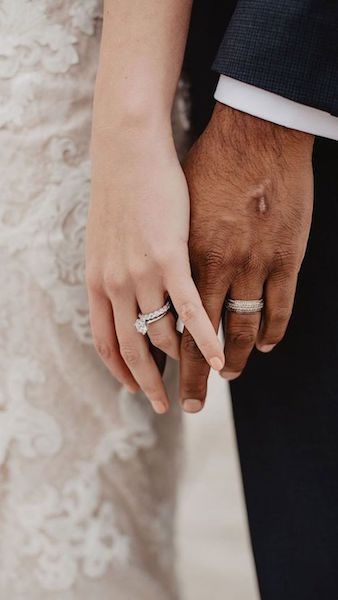If you’re not yet part of the Ask a Real Bride Instagram community, you have to join us: brides to be, mothers of the bride and groom, bridesmaids, and anyone who loves weddings will find daily etiquette Q+A’s, fun videos, and quick tips to make wedding season more enjoyable!

Week after week, brides (and sometimes parents of the bride) write in, wondering if there’s a way to approach the groom’s parents about finances. Real brides ask:
“Can you provide guidance on asking the groom’s parents if they are contributing money to the wedding?”
“Is it ok for us to ask his parents for money if we’re over budget and my parents are contributing too?”
Let’s take a look at eight things you might want to discuss before you talk to your in-laws!
1. Traditional costs the in-laws cover:
Although we’re most familiar with the tradition of the bride’s family hosting the wedding, there are a few wedding-related expenses the groom’s family is traditionally expected to cover: the rehearsal dinner, the bride’s bouquet, and her wedding day transportation.
Of course, some in-laws do much less, and others do more. Here’s what the in-law involvement looks like for the real brides who responded to this poll question:

2. Wait for the offer:
Most in-laws are, at the very least, aware of their responsibility to host the rehearsal dinner and will approach the couple with ideas for venues, the guest list, etc. Additionally, if the in-laws are willing and able to contribute to the actual wedding, they’ll most likely initiate the conversation. Check out these poll results from the Real Brides of Instagram:

3. …or request privately
If your future in-laws haven’t mentioned a rehearsal dinner, I first recommend talking to your fiance. Maybe they aren’t aware of the tradition, or they’re unable to take on the expense. Whatever you suspect, I recommend asking your fiance to speak to his parents privately. This will allow them to avoid embarrassment and talk freely about what can be a touchy subject.

4. Share a “need”
If your fiance feels that his parents may be willing and able to give more to the wedding day itself, he can speak to them privately and share where their contribution would be most helpful.
I recommend looking over your vendor contracts and seeing if there’s one bill the in-laws may be able to cover in full. It could be the traditional expenses for in-laws, like the bouquet or transportation, or something like photography, videography, or entertainment.
Asking them to cover a concrete expense, rather than giving you an amount to spend on anything, is helpful for a few reasons: they know where their contribution is going, and you avoid them trying to exert influence over every single wedding choice, rather than the specific item they are covering.
A real bride shares:
“We asked for a specific item (rather than an amount) to limit issues and opinions!”
Having this conversation privately with their child will allow them to respond honestly without feeling pressured by your presence. And you never know–they may eagerly accept and offer to do even more!
5. If they’re making requests, be upfront about what you can afford:
You might find that while your in-laws haven’t offered to contribute money to the wedding, they have no problem offering their opinions about it!
A real bride asks:
“My in-laws haven’t offered to contribute but insist on an extensive guest list! How do I navigate this?”
This can actually become an opportunity for them to offer to help.
My advice: have your fiance speak to them privately and say, “We wish we could afford to host all of your loved ones, but it’s not in the budget. Right now, we can only afford X number of guests on our side of the family, and that number is firm.”
At this point, they might offer to cover the cost of the additional guests and contribute money toward the wedding.
Another real bride shares:
“We said we’d need to cut about 15 guests on his side. My in-laws didn’t like it and therefore offered to pay! It worked wonderfully though it wasn’t our intention.”
If this happens, be sure to add in the cost of not only food, but extra centerpieces and rentals (like chairs, linens, etc.) for the additional guests.

A mother of the bride wrote in with this dilemma:
“We are paying for everything. We don’t drink, but the groom insists we serve beer and wine. Who should pay for this? The groom or his family is not coming forward. Should we just have a dry wedding?”
Once again, this is an opportunity for the groom or his parents to participate financially. My advice to this mother of the bride: assuming you are comfortable with the presence of alcohol but simply wish not to have to budget for it (which I completely understand), this is when you could say to your future son-in-law: “Alcohol isn’t something we are willing to pay for, but if you’d like it at the wedding, we just ask that you cover that expense in full.” Then, share the bar packages from the venue. He can then decide if he is willing to fund it or need to ask his parents to contribute.
6. Get Creative:
While tradition is often a helpful guide, a few real brides reached out to share approaches that worked for them!
Here’s what our real brides have to say:
“My fiance’s parents offered to pay for the rehearsal dinner (because that’s what’s traditional), but we asked if we could allot those funds toward the wedding as we wanted a very simple backyard rehearsal dinner.”
“My future in-laws are giving us a set amount, and whatever is left after the rehearsal dinner, we get to put toward wedding costs or buying a home.”
Refer back to point #2: It might be best to wait for your in-laws to initiate this kind of set-up or have your fiance speak to them privately.

7. Warning: Accepting money may mean accepting their feedback, too:
A mother of the groom shares:
“I am an in-law, and I grew up under the etiquette that the wedding was the bride’s family’s responsibility, other than the bride’s bouquet and rehearsal. If that were to change, the bride needs to be open to suggestions made by the in-laws. My heart and head say kids don’t need to plan for more than they can afford by traditional standards. If money is tight, I would be more than happy to pitch in. But I am not interested in funding a production for show. I’m more interested in the marriage, not the event.”
A bride says:
“My in-laws think that by contributing, they have a right to make decisions!”
While you might wish a contribution could come with “no strings attached,” often, you must navigate expectations and opinions once money is involved. Only accept their help if you’re willing to hear them out!
8. Honor them regardless of their contribution
Not every in-law is willing to contribute to wedding costs, and that’s ok. Some look forward to pouring all their resources and energy into the rehearsal, others are firm believers in tradition, and some are simply unable to contribute financially.
Even if your in-laws aren’t giving financially to the wedding, seek ways to include them in the planning process and on the wedding day. Wondering how to do that? I have a whole post with ways to honor your in-laws before, during, and after the wedding!

The bottom line:
Financial conversations can be tricky, so leave it up to your fiance to speak privately with his parents regarding their involvement, budget, and comfort level.
Have a Question for our Real Brides?
Let me know what topic you’d like us to tackle next! And if you’re interested in learning more about etiquette, gift-giving, and celebrating in style, be sure to subscribe to the RegistryFinder GiveIt blog for weekly posts on wedding etiquette, bridal showers, wedding trends, and of course, wedding registry guidelines and tips! And as always, refer your guests to RegistryFinder.com, where they can conveniently locate all of your registries in one place!

